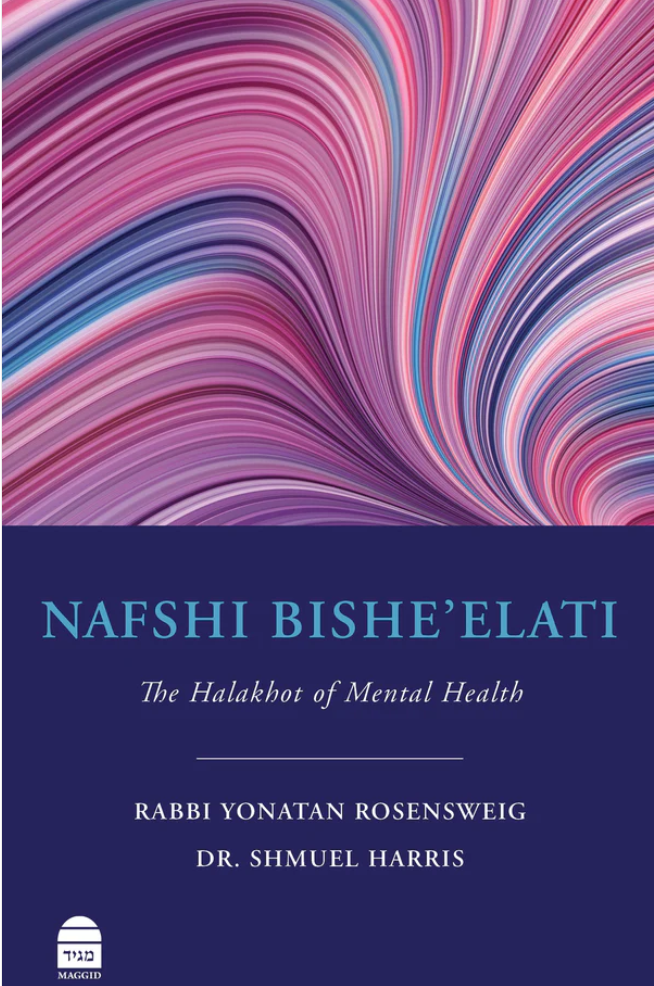When Two Are Better Than One
By Rabbi Dr. Jonathan Schwartz
Book Reviews: Nafshi BiShe’elati: The Halakhot of mental health (By Rabbi Yonatan Rosensweig and Dr. Shmuel Harris) English edition 2025: Maggid Press.
Stories & Halacha from the psychiatrist’s couch (By Dr. Yaakov Freedman & Rabbi Akiva Dershowitz) March, 2025: Adir Press
In life, things are usually better in pairs. Shlomo HaMelech states unequivocally, “Two are better than one, since they have good reward for their toil.” (Kohelet 4:9) Rashi explains that two people are always better than one since a lot of things are accomplished by a team of two where each part of the team has the space to put in the hard work to achieve that which an individual working on his own would not have even bothered to try. Learning not only one’s limits, but also how having a partner who can pick up with his or her expertise on a project helps not only insure against failure, it actually makes our projects thrive. Therefore, Rashi encourages us not to live alone but to develop good friendships and marriages.
I find myself returning to Rashi’s words as I have delved into two excellent recent releases in the complex field of mental health and halacha. Both were written by terrific teams of experts, in halacha and mental health, who have worked together to illuminate some of the important challenges facing our frum, halachicallycommitted Jewish community worldwide. Each approached the subject in an engaging way though both works are very distinct from one another. However, one thing is clear—both the psychiatrists and the rabbanim in both works genuinely respect and admire one another. As a rabbi who happens to be a psychologist, I’ve been asked if, and how, my rabbinic colleagues and our revered poskim and roshei yeshiva can foster a bridge with the mental health community. As a psychologist who happens to be a rabbi, I’m also asked by my colleagues and students in the field of mental health if the rabbanim can bridge and work with the mental health community. To many on the outside it might appear that these two fields need to be distinct and separate. However, that is the furthest thing from the truth. Rabbanim and poskim as well as psychiatrists, psychologists, and therapists have been consulting and advising one another appropriately and the kesher has been getting stronger as time goes on. Perusing both works one is immediately struck by the teamwork that both teams of highly regarded professionals share and the result is a greater product—a better cared for, Jewish people.
At the same time, these two works are markedly distinct. In Rav Rosensweig’s and Dr. Harris’s NafshiBishe’elati, the approach is more academic/halachic. The team begins the work with a comprehensive foundation of the halachic terms likely to be encountered when dealing with mental health issues. Thus, a chapter is dedicated to the term shoteh, its meaning and application, and immediately followed by a chapter discussing the different levels of illness as recognized in the classic halacha sources. Clarifying these terms is essential before one can turn to the specific questions that make up the majority of the work wherein the authors address mental health issues that might affect one’s observance of mitzvot based on the general order of Shulchan Aruch. Issues such as whether one who is mentally challenged can put on tefillin appear before questions about whether one who is experiencing a panic attack on Yom Kippur should take medication. Each issue is researched and sources are provided for each halachic issue of the work in the fantastic footnotes.
While on the subject of the footnotes, I must note my appreciation of Rav Rosensweig and Dr. Harris’s diversity and thoroughness in their consultation and reporting from a variety of poskim from different backgrounds in the halachically committed community. In any given footnote the reader might learn the positions of previous Gedolim like Dayan Yitzchock Weiss (Minchas Yitzchok, Rav Shmuel Wosner (ShevetHalevi), Rav Moshe Feinstein (Iggros Moshe), and Rav Ovadiah Yosef (Yabia Omer, Yichaveh Daas) contemporary Chareidi poskim like Rav Yitzchak Zilberstein and Rav Asher Weiss, Dati Leumi poskim like Rav Eliyahu Abergel, Rav Reem Hacohen (Rosh Yeshiva of Yeshivat Otniel), Rav Yuval Cherlow (Rosh Yeshiva of Yeshivat Hesder Amit Orot Shaul), and Rav Rosensweig’s rebbe Rav Nahum Rabinovitch alongside YU-affiliated poskim Rav Hershel Schachter and Rav Mordechai Willig. The plethora of halachic approaches underscores to the reader, whether a rav, mental health professional, or even those suffering from mental illness and their loved ones that halacha sees these issues as real and relates to the issues and the people living with them with respect and care in all halachic circles.
That said, when writing a halachic work in English, especially one on a topic that has so much nuance to each issue and diagnostic category, there is a natural fear that the halachic conclusions might be misapplied. In honesty, I had that fear after learning that the Hebrew version of the work was being translated. It was compounded when the publisher advertised the work as “The Shmiras Shabbos K’Hilchasa of mental health.” However, unlike the Shmiras Shabbat K’Hilchata whose English version was quite limited in its detail, NafshiBishe’elati’s authors regularly remind their readers, even after comprehensive footnotes to look to the Hebrew version which contains more depth, helping to encourage halachic discussion and help in navigating nuance instead of merely offering blanket psak where it would otherwise be out of place. The writers themselves make this clear throughout the work and especially in the fantastic appendix (p. 283 “A reference guide for halachicrulings on mental health disorders”).
While Nafshi Bishe’elati provides the academic approach to the halachot of mental health, Dr. Yaakov Freedman and Rabbi Akiva Dershowitz’s Stories & Halacha from the Psychiatrist’s Couch provide its perspective and soul. Dr. Freedman is well known for his heartwarming and yet contemplative columns in Jewish publications and his previous works. He has a unique way of inviting his readers into his office and giving them a view of the people he encounters and the different struggles (and triumphs) they experience. In Stories & Halacha from the Psychiatrist’s Couch, Dr. Freedman introduces (and to the eagle-eyed avid reader of his works sometimes re-introduces) the reader to the diverse members of Klal Yisrael he works with. In most cases I would refer to them as his patients but one of the beautiful things about the book is that the reader is quick to see the people behind the diagnosis and how Dr. Freedman works with them to set plans in motion for their improvement. His Ahavas Yisrael and his esteem for his patients, their families, and his colleagues is palpable in each chapter and case in the book and is a crucial lesson for anyone working with Acheinu Bnei Yisrael as it is a recipe for success.
In the current work, Dr. Freedman partners with Rav Akiva Dershowitz whom Rav Asher Weiss noted “is one of his closest talmidim” (Foreword p. 5) and is a rav, rosh kollel, and posek in Ramat Eshkol. I have had the pleasure of knowing, collaborating with, and learning from Rav Dershowitz in the past and can proudly say that the Ahavas Yisrael that Dr. Freedman exudes in his writing is equally shared and displayed by Rav Dershowitz. At the end of each chapter/case presentation, Rav Dershowitz responds to a particular halachic dilemma that arose in the case. Sometimes the issue might be directly linked to the therapeutic exchange (e.g. “What is the halacha regarding a child who must tell sensitive information about their parent for the sake of medical treatment?”) and sometimes more general (e.g. “How does halacha determine what is appropriate payment for a physician’s services?”). Writing for a more general audience, Rav Dershowitz’s responses are often shorter than those in Nafshi Bishe’elati and almost always are more general than, but clearly related to, the specific case Dr. Freedman wrote about. At times I found myself trying to predict the halacha question that would appear at the end of the chapter and was surprised by the choice of topic but I was certainly not disappointed by the sensitive nuance and diversity of topics covered throughout.
Both Nafshi Bishe’elati and Stories & Halacha from the Psychiatrist’s Couch remind us that the integration of Torah scholarship and mental health sensitivity is not only possible, but imperative. Each page of these books, in its own unique voice and structure, strengthens the kesher between Torah values and psychological insight, between rabbanim and therapists, between academic rigor and human warmth. These works are more than just informative—they are transformational. These works highlight the importance of realizing that “two are better than one” whether we are speaking about two people working together or two works that complement one another. I wholeheartedly recommend both to rabbanim, therapists, and anyone seeking a deeper, more refined understanding of the human mind through the lens of halacha and compassion. n
Rabbi Dr. Jonathan Schwartz is the Clinical Director of the Center for Anxiety Relief, a practice that specializes in the treatment of OCD, Anxiety Disorders and Perfectionism. He is also an Adjunct Instructor at Ferkauf Graduate School of Psychology. A practicing rav for over 25 years in shuls in NYC and Hillside/Elizabeth, NJ, he has served as a consultant to both clergy and mental health professionals as well as the general Jewish community who are dealing with the intersection of mental health and Jewish life and law. He can be reached at [email protected].














